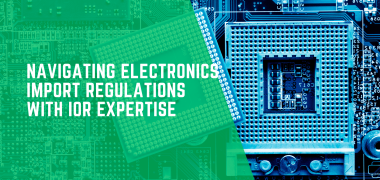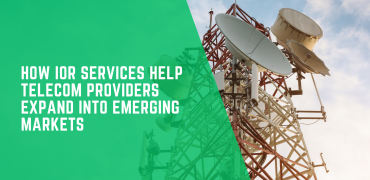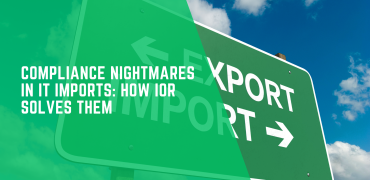In today’s interconnected world, the import of electronics is a cornerstone of global trade, fueling industries, businesses, and individual consumers. The demand for advanced gadgets, innovative technologies, and efficient tools has led to a booming market for electronics imports. However, this lucrative opportunity is fraught with challenges, particularly in the form of regulatory compliance. Understanding and adhering to import regulations is critical to ensuring smooth operations and avoiding costly penalties. One key player in this landscape is the Importer of Record (IOR), whose expertise is invaluable in navigating these complexities.
The Landscape of Electronics Import Regulations
Import regulations vary widely between countries, encompassing tariffs, documentation requirements, certifications, and restrictions on certain goods. The electronics sector is particularly complex due to rapid technological advancements and stringent safety standards. Key areas of focus include:
- Compliance with Local Standards: Most countries have specific standards for electronics, such as the CE marking in the European Union or FCC certification in the United States. These standards ensure safety, electromagnetic compatibility, and environmental sustainability.
- Customs Documentation: Accurate and complete documentation, including invoices, bills of lading, and certificates of origin, is vital. Errors or omissions can lead to delays, fines, or even confiscation of goods.
- Tariffs and Duties: Import duties on electronics can vary significantly depending on the product type and country of origin. Understanding and calculating these costs is essential for financial planning.
- Restricted and Prohibited Items: Some countries impose restrictions on certain electronic items, such as those with advanced encryption technology or components deemed a security risk.
- Environmental Compliance: Regulations like the Restriction of Hazardous Substances (RoHS) and Waste Electrical and Electronic Equipment (WEEE) directives require adherence to environmental standards.
The Role of the Importer of Record (IOR)
An IOR is an entity or individual responsible for ensuring compliance with all import regulations. They act as the legal importer, handling the required documentation, paying duties and taxes, and ensuring the shipment meets local regulatory requirements. Their role is particularly crucial in the electronics sector due to its complex regulatory landscape.
Key Responsibilities of an IOR:
- Regulatory Compliance: The IOR ensures that all imported electronics comply with the destination country’s regulations, including safety and environmental standards.
- Customs Clearance: They handle customs documentation and liaise with customs authorities to facilitate smooth clearance.
- Payment of Duties and Taxes: The IOR is responsible for calculating and paying import duties, VAT, and other applicable taxes.
- Record Keeping: Maintaining accurate records of all import activities is a legal requirement in most jurisdictions and a crucial part of the IOR’s responsibilities.
- Risk Management: An IOR anticipates and mitigates risks, such as compliance issues or shipping delays, to prevent disruptions.
Benefits of Leveraging IOR Expertise
Partnering with an experienced IOR offers several advantages, especially for businesses navigating the intricate world of electronics imports:
- Streamlined Processes: IORs simplify the import process, ensuring that all regulatory requirements are met efficiently.
- Cost Savings: By avoiding penalties, fines, and delays, businesses can save significant amounts of money.
- Expertise in Regulations: IORs stay up-to-date with evolving regulations, providing invaluable insights and guidance.
- Risk Mitigation: Proactive risk management minimizes disruptions and ensures business continuity.
- Focus on Core Activities: Businesses can concentrate on their primary operations while leaving the complexities of import compliance to the experts.
Common Challenges in Electronics Imports
Despite the benefits of IOR expertise, the electronics import process is not without its challenges. Understanding these pitfalls is essential to avoid costly mistakes:
- Evolving Regulations: Regulations in the electronics sector are continually changing to keep pace with technological advancements and environmental concerns.
- Complex Supply Chains: The global nature of electronics manufacturing often involves multiple countries, each with its own regulations.
- Counterfeit Products: Ensuring the authenticity of imported electronics is a growing concern, particularly for high-value items.
- Taxation Issues: Miscalculating duties and taxes can lead to financial losses and legal complications.
- Cultural and Language Barriers: Navigating foreign regulatory landscapes can be challenging without local expertise.
Strategies for Effective Electronics Import Management
To overcome these challenges and ensure a successful import process, businesses should adopt the following strategies:
- Partner with Experienced IORs: Collaborating with seasoned IORs ensures compliance and minimizes risks.
- Invest in Technology: Digital tools and software can streamline documentation, tracking, and compliance management.
- Stay Informed: Keeping up-to-date with regulatory changes is crucial for maintaining compliance.
- Perform Due Diligence: Verify the authenticity of suppliers and the quality of goods to avoid counterfeit products.
- Plan for Contingencies: Anticipate potential issues, such as customs delays or regulatory changes, and have backup plans in place.
Case Studies: Success with IOR Expertise
Case Study 1: A Startup’s Smooth Market Entry
A tech startup aimed to launch a range of smart home devices in the European Union. The company partnered with an IOR to navigate the CE marking requirements and environmental regulations. The IOR ensured that all devices met EU standards, managed customs clearance, and facilitated a seamless market entry. As a result, the startup launched on schedule and gained a competitive edge in the market.
Case Study 2: Avoiding Penalties in a Complex Supply Chain
A multinational corporation faced challenges importing components for its electronics assembly plant. The company’s supply chain involved multiple countries, each with distinct regulations. By leveraging IOR expertise, the corporation ensured compliance at every stage, avoided penalties, and maintained uninterrupted production.
The Future of Electronics Imports and IOR Services
The electronics industry is poised for continued growth, driven by innovations like artificial intelligence, the Internet of Things (IoT), and renewable energy technologies. As the sector evolves, so will the regulatory landscape. Emerging trends include:
- Increased Focus on Sustainability: Environmental regulations are likely to become more stringent, emphasizing the need for compliance expertise.
- Digital Transformation: Automation and blockchain technology are revolutionizing customs processes, making them more efficient and transparent.
- Global Trade Agreements: Changes in trade policies and agreements will impact tariffs and regulatory requirements.
IOR services will play an increasingly critical role in helping businesses navigate these changes, ensuring compliance and enabling growth.
Conclusion
Navigating electronics import regulations is a complex but essential aspect of global trade. The expertise of an Importer of Record can make a significant difference, ensuring compliance, minimizing risks, and optimizing processes. For businesses aiming to thrive in the dynamic electronics market, leveraging IOR services is not just a strategic advantage—it is a necessity. By staying informed, investing in technology, and partnering with experienced professionals, companies can successfully navigate the regulatory landscape and unlock the full potential of the global electronics market.




